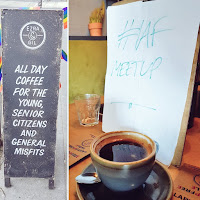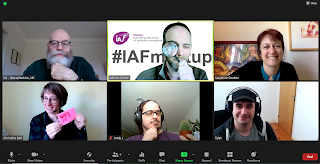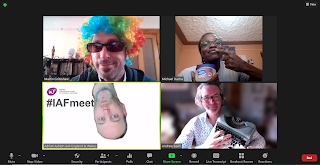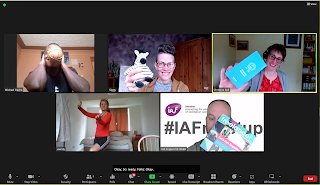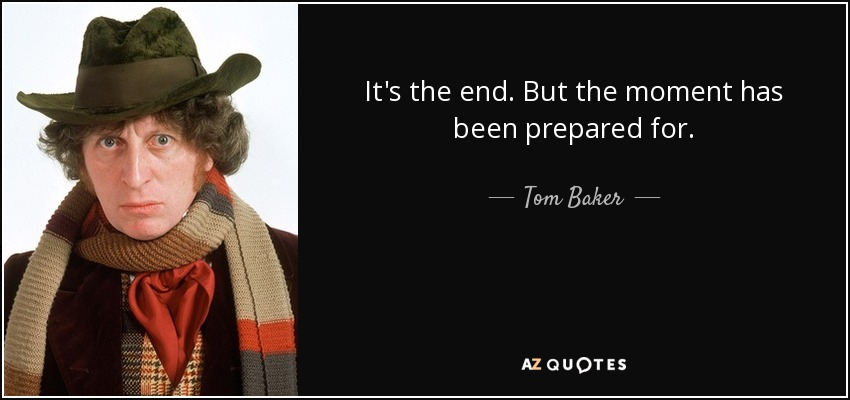As freelancers and small business owners, there seem to be constant exhortations for us to be part of a community. And I recognise the various benefit of being part of such peer networks, having invested time, emotion, money (and even professional reputation) in many over the years.
But over the years, despite having been part of many 'communities', I'm starting to wonder if I'm accidentally having an 'albatross effect' on them, as they all seem to 'die' after my being involved with them..!
However, this post isn't about me suggesting I'm a potential jinx, but rather to ponder how the ending of a self proclaimed community might reveal just how far it really was ever a real community to begin with:
In contrast, the other 2 examples are worth lingering over:
Freelance Heroes (FH) was created in 2016 and referred to itself as a community for freelancers - and indeed, created lots of things to facilitate such a sense and practice of community, inspiring many other freelancer communities to coalesce in response to their mere existence: from it's original Facebook group, conferences were added, chat forums introduced, twitter hours with member of the community being invited to lead and manage them, 'featured freelancers' profiled (published interviews and youtube lives), peer learning sessions by member for members, a virtual library of books written by its members, and optional paid subscriptions (with additional pirkx).
But at the end of 2023, it was suddenly announced by email that FH would imminently be being closed, and all of its associated artefacts and IP (website, forums, blogs, etc) would be being taken down.
Reasons were given about financial pressures, and people's capacity etc, and while there's plenty that FH can be proud of having achieved and influenced, for a body that presented itself as being a community, the upset that many expressed in the immediate wake of the announcement is possibly based on all of us feeling we were part of just that: a community. That the owners of that community seemingly hadn't trusted or respected us enough to share that there may be tough decisions to be taken, or to try and engage us all in conversations about possible succession and legacy options, maybe helps to explain how and why so many people were upset by the announcement - after 7 years of feeling we were part of a community, we suddenly realised that we never were in any meaningful way when it came to the big important decisions about us.
And more recently, the Good Business Club (GBC), established 6 years ago has suddenly made a similar announcement about closing up in the next few weeks - a shock decision that's seemingly come out of nowhere after years of all us members of it being encouraged to be actively involved in leading and developing activities and initiatives for the benefit of the wider community of its members. So again, I'm left wondering, how much of a community were we really being allowed to be, if we can all be disbanded by a discretionary decision of the founders of it?
Importantly, for context, I think there's a lot of things that have been going on behind the scenes at GBC which are highly charged and emotive in leading up to this apparently 'out of nowhere' announcement - based on the official statement of its being wound up seemingly contradicting itself:
(1) The founder opens by saying that they are stepping down from running the GBC after a tough professional and personal year (but no sense yet of this spelling the end for the GBC, as they'd always clearly managed their personal role and identity as being separate and distinct from that of GBC);
(2) it's then immediately stated in a bold heading that the community will continue;
(3) but it's then clarified at the very end that all the forums, websites, and membership fees will be cancelled and ended in the next few weeks (and we're signposted to another paid 'community' we can join instead - which costs 25% more). So actually, despite how this statement began, it really is a 'so long and thanks for all the fish' goodbye to all of it.
All of this leaves me wondering and feeling if its really worth my investing time, energy, money, and emotion into any self proclaimed 'community', when at any time, a small group of people within it can suddenly pull the plug on it all with no warning or notice (as added embarrassment in both instances, I'd been actively working on developing new strategic partnerships for FH with other national sector bodies on their encouragement and with their full knowledge, when their announcement was made with no prior warning - so first I knew of it, was also when the contacts in other bodies I'd been speaking with also found out. And a week before GBC announced its closing, the leaders of it had approached me to talk about my developing and running events and initiatives in the community's name).
Maybe all these self-proclaimed 'communities' we see out there, aren't really communities at all, if the people who make them up are never actually trusted with hard truths or realities about looming difficult decisions facing it, nor given opportunity to step up and help to mitigate challenges that it may be being faced with?
What I'm taking from these knocks (there have been others over the years - I'm just reflecting on the most recent ones in this post), is that in the future, any group that presents itself as a 'community' and invites me to join, will get a bit more of a due diligence on my part to see just how far it really is a community, or it's actually just a club controlled by a selected few that would actually just like my money to help keep their idea going. And at any moment, the 'rug may be pulled out from under our feet' without warning, and we all find ourselves back in this stage of shock and disbelief about what's happening.
Finally, I'm aware that some people who may read this post will find it hard and painful, because they were part of the leadership teams for these communities, and so will naturally feel a sense of responsibility for how the ending of these groups played out, despite their best efforts and intentions.
This post isn't meant to be any smear or indictment of their character, but an opportunity for me to grieve these wider groups' passing (moving through the stages of denial, anger, bargaining, depression, and acceptance), and to reflect on the manner in which the process has been managed has on me for how I approach similar things in the future. Very often when 'communities' end, there's an outpouring of encouragement and support for those that made the decision and had bee the figures heads in leading/founding them (and rightly so), but rarely an opportunity or space for those of us who were part of them to reflect on what their ending means for us.


